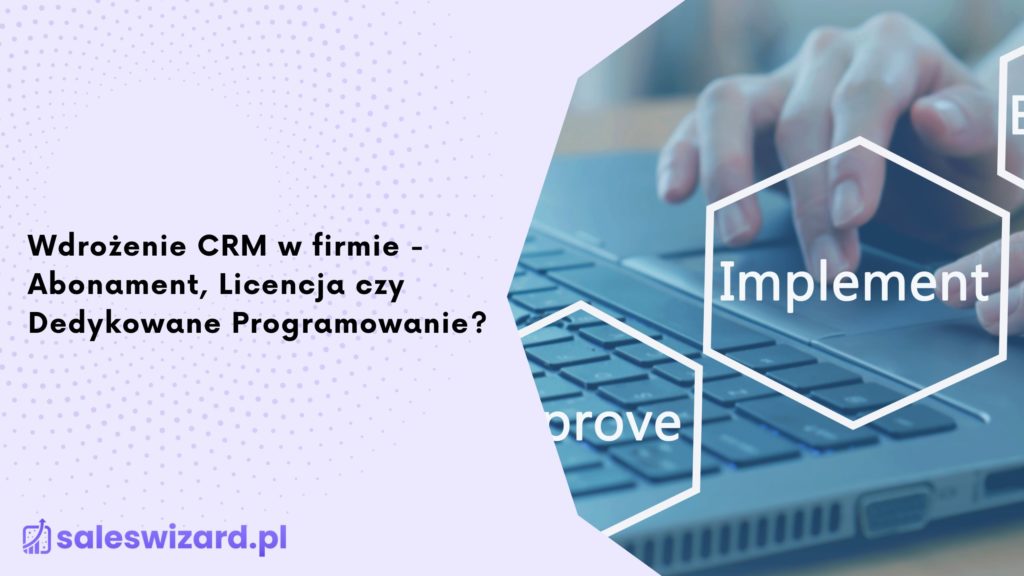CRM implementation in a company – Subscription, license or dedicated programming?

Implementing a CRM system – which path to take?
Implementing a CRM system in a company is a key component of its customer relationship management strategy, and getting it up and running can require detailed training. Deciding on the right deployment model – subscription, licensed or dedicated programming – can have a significant impact on business operations. In this article, we’ll discuss the key CRM features you may need, and compare different deployment models to help you make an informed choice.
Wondering which CRM system to implement at your place?
See what the implementation of a CRM system looks like! You can read more on this page!
Benefits of implementing a CRM system
CRM is a tool that enables companies to effectively manage customer relationships. Its use brings numerous benefits, such as increased sales, improved customer service, better understanding of the market and optimization of business processes. Key CRM features that contribute to these benefits are:
Contact management
- Storage of detailed customer information.
- A history of customer communication.
- Segmentation of customers based on various criteria can be implemented as a new functionality.
Marketing automation
- Create and manage email campaigns.
- Track and analyze the results of marketing campaigns.
- Personalization of marketing communications, which increases customer engagement.
Sales management
- Tracking leads and potential customers is a new functionality implemented in your company’s CRM system.
- Sales Forecasting.
- Automating the sales process, which allows you to manage your sales team more efficiently, is a key step in your company’s implementation process.
Customer service
- Notification and troubleshooting systems are part of the new system being implemented in your company.
- A knowledge base and frequently asked questions (FAQs) can support employee training during the implementation phase of your company’s system.
- Real-time communication tools such as chatbots.
Analytics and reporting
- Sales and marketing reports.
- Customer data analysis.
- Monitor team performance and efficiency of operations.
CRM implementation models
CRM in a subscription model (SaaS)
The subscription model, also known as Software as a Service (SaaS), involves paying a monthly or annual subscription for the use of a CRM system. Under this model, the customer gets access to all the features and services offered by the CRM system, such as contact management, data analysis, sales process automation, etc.
Benefits of the subscription model include liquidity, as fees are spread out over months or years, making it easier to budget and avoid large upfront investments. In addition, customers have the flexibility to customize their subscription plan to meet changing needs, allowing the system to scale as businesses grow.
However, the subscription model can only be profitable in the long run, as accumulating fees can exceed the cost of purchasing a CRM system. In addition, there are risks associated with becoming dependent on a SaaS provider, which limits control over the system’s data and functionality. So it is worth carefully weighing all the advantages and disadvantages of the subscription model before deciding to implement it in the company.
Advantages
- Low initial costs: No need to invest in IT infrastructure.
- Regular updates: The system is always up-to-date and compliant with the latest security standards.
- Flexibility and scalability: Ability to easily customize the number of users and functions to meet company needs.
- Shorter implementation time: Off-the-shelf SaaS solutions can be quickly implemented and deployed.
Disadvantages
- Long-term costs: May be higher compared to a one-time license fee.
- Limited customization can affect the successful implementation phase of a new system: Less flexibility to personalize the system.
- Dependence on a vendor can affect the implementation phase of a new system: The need to rely on an outside vendor for system availability and security.
CRM in a licensed model
The licensed model involves the purchase of a one-time license for the CRM software, which is installed on the company’s servers. The customer pays for a license to use the CRM software for a certain period of time, such as one or two years. After that time, it is necessary to purchase the license again or renew the existing license. The licensed model differs from the subscription model, where the customer pays a subscription to use the CRM software for a specified period of time.
In the licensed model, the customer has full control over the software, which is installed on the company’s servers, while in the subscription model, the customer uses a cloud-based service without having to install the software on its servers.
Using a licensed model can be advantageous for companies that want full control over CRM software and prefer the traditional approach of purchasing licenses. However, it can also be more costly than the subscription model, as it requires a one-time license fee. Each company should carefully analyze its needs and financial capabilities to choose the right CRM software purchase model.
Advantages
- The one-time purchase cost also includes training for your company’s employees: no need for regular subscription fees.
- Greater control over data: Data is stored on the company’s servers, which can increase security.
- Customizability: The system can be better customized to meet the company’s specific needs.
- Security: Greater control over data security and availability.
Disadvantages
- High initial costs: Need to invest in IT infrastructure.
- Maintenance costs: The need to hire IT staff to manage the system and updates.
- Longer implementation time: The process of installing and configuring the system can be time-consuming.
Dedicated CRM programming
Dedicated programming involves creating a CRM system from scratch, tailored exactly to the company’s needs. It is the process of creating software that is dedicated solely to a particular company or industry, taking into account all its specific requirements and business processes. Dedicated CRM programming allows full personalization of the system, so that the company has the opportunity to customize it to its individual needs and requirements.
Advantages
- Full customization in a new system can be crucial to the implementation stage in your company: the system is designed according to the company’s requirements to make the implementation stages as efficient as possible.
- Unique features: Ability to implement specific features that are not available in off-the-shelf solutions.
- Lack of licensing restrictions can be an asset during the process of implementing a new system in your company: The company has full rights to the software.
Disadvantages
- High cost: Costly and time-consuming to implement.
- Long implementation time: The process of developing a system can take a long time.
- Technology risk: Need to constantly work with the development team to maintain and develop the system.
- Maintenance and support: Need for ongoing maintenance and support.
What features are essential in a CRM system?
When choosing a CRM system, it is worth paying attention to several key features that can significantly affect the efficiency of its operation:
- Integration with other systems: The CRM should work with other tools, such as ERP systems, e-commerce platforms or marketing tools.
- Mobility: Access the CRM from mobile devices, allowing you to work remotely.
- Data security: A high level of security to protect sensitive customer information is crucial during the implementation phase of a new system.
- Artificial Intelligence: Using AI to analyze data, forecast sales and personalize communications.
- Process automation: Enables automation of routine tasks to increase work efficiency.
- Interface personalization: The ability to customize the user interface for individual employees is a new feature introduced during the implementation process.
- Document management: Features for easy storage and sharing of customer-related documents.
How to choose the best CRM implementation model?
The decision to choose a CRM implementation model should be based on several key factors:
Company size and budget
Small companies may prefer a subscription model due to lower upfront costs and ease of implementation. Larger companies with adequate financial and IT resources may lean toward a licensed model or dedicated programming, which offer greater control and customization.
Specific business needs
If a company has very specific requirements that cannot be met by standard solutions, dedicated programming may be the best choice, and the implementation process should be planned in detail. On the other hand, companies with less complex needs can successfully use off-the-shelf subscription or licensed solutions.
Scale and flexibility
Companies planning rapid growth may prefer the subscription model because of its flexibility and scalability. The licensed model may be more suitable for companies that anticipate stable growth and can invest in IT infrastructure.
Level of technical support
In the subscription model, technical support is usually part of the offering, which is beneficial for companies without an in-house IT department. In the licensed model and dedicated programming, technical support requires hiring an in-house IT team or using external specialists.
What to follow when implementing a CRM system?
Implementing a CRM system in a company is an investment that can bring significant benefits in the form of better customer relationship management, increased sales and optimization of business processes. Choosing the right implementation model – subscription, licensed or dedicated programming – depends on the company’s specific needs and capabilities.
